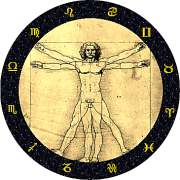Weboteric - Astrology
|
 |

Astrology - Venus
Star of the Morning Sky
Venus, the morning star, representing the feminine virtues whilst heralding the dawn.
Its symbol is the circle of spirit elevated over the cross of matter - reminding us of the Egyptian Ankh.
Mythology
In Roman Mythology Venus was said to be the daughter of Jupiter, although she was born of the Sea and the Sky and came to earth in a shell from under the sea.
The Roman goddess of love and beauty was originally a vegetation goddess and patroness of gardens and vineyards.
This mythos was taken from the Greek where she was Aphrodite, the beautiful daughter of Zeus As the goddess of love, she had affairs with gods and humans but her true love was Mars. She was forced by the god Jupiter to marry Vulcan, a blacksmith.
Venus had a son named Cupid, the mischievous and winged god of love. He was her constant companion; and, armed with bow and arrows, he shot the arrows of desire into the bosoms of both gods and men. He later married Psyche and they produced a child named Pleasure.
Venus is, of course, associated with affairs of the heart. The last great temple of Venus was built by the emperor Hadrianus near the Colosseum in 135 AD.
Effects of Venus
Astrologically Venus is seen as THE FEELINGS, an indicator of your values. A planet of fortune, pursuit of pleasure, beauty in form, social interactions, an indicator in your chart of your inclinations towards romance, marriage and other partnerships.
Refiner of the aesthetic and artistic and giver of the sentiments of love and sharing. Venus is the goddess of love and beauty and where Mars uses physical force, Venus seduces and persuades.
All things that are pleasant and leisurely are symbolised by Venus. Her domain is music, art, games, dancing, acting and all things that are used for adornment or ornamentation, such as perfumes, cosmetics, jewellery and fine fabrics.
As Lady Luck she has special significance for gamblers. A feminine planet, her action is to pacify, harmonise, make beautiful and soften. How Venus will manifest her energy, a soft and cooling one which seeks harmony and an indicator of your inclinations and values, depends on the horoscope as a whole. The Sign (and its Element), the House in which if falls, and the Aspects to the other planets will all have a bearing on any interpretation.
Venus shows our values and our need and capacity for love. This planet shows aesthetic preferences and the natural attraction we feel to people and things. Venus represents the need for inner and outer harmony and balance. It is associated with the inner feelings we have when we compare and make judgements. Venus also represents sisters and other influential women, as well as our experience of the emotional harmony between our parents.
The Sign Venus is in indicates how our values are coloured and what specific aesthetic styles we adopt. Choices of partner are strongly influenced by this Sign position. Venus is always found close to the Sun in the horoscope - either in the same sign, or in one of the two signs alongside the Sun.
The House Venus is in shows in what particular area of life we find love, companionship and partnership, and where we have the strongest and most rewarding emotional contacts. This House shows what we value specifically, and where we can be enriched both emotionally and financially.
Aspects to Venus indicate specific experiences in love relationships and the individual psychological needs that colour our judgement when making choices.
Venus Key Facts |
|
Rules: |
|
Detriment: |
|
Exhalt: |
|
Fall: |
|
Colours: |
Light blues and greens, pastel shades |
Stones & Metals: |
Jade, lapis lazuli, copper and brass. |
Keywords: |
Beauty and love, |
Astronomy
Venus' rotation is somewhat unusual in that it is both very slow (243 Earth days per Venus day, slightly longer than Venus' year) and retrograde. In addition, the periods of Venus' rotation and of its orbit are synchronised such that it always presents the same face toward Earth when the two planets are at their closest approach.
Venus is sometimes regarded as Earth's sister planet. They are very nearly the same size and at one time it was thought that, below its dense clouds, Venus might be very Earthlike and might even have life. But, unfortunately, modern study of Venus reveals that in many important ways it is radically different from Earth.
The pressure of Venus' atmosphere at the surface is about the same as the pressure at a depth of 1 km in Earth's oceans. There are several layers of clouds many kilometres thick composed of sulphuric acid. This dense atmosphere produces a run-away greenhouse effect that raises Venus' surface temperature to hot enough to melt lead (459°C)
Daylength (rotation) |
243 Days |
Year length |
227 Days |
Distance from the sun (average) |
67.23 million miles (108.2 Million KM) |
Distance from Earth (shortest) |
25.7 million miles (41.4 Million KM) |
Distance from Earth (greatest) |
160 million miles (257 Million KM) |
Size (Earth=1) |
0.95 |
Mass (Earth=1) |
0.82 |
No of moons |
None |


Copyright © Weboteric.com 2006 Webdesign by WebOneUK